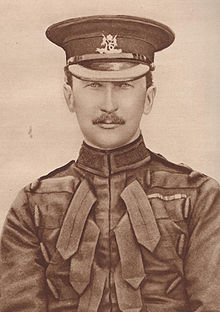Fifth Army (United Kingdom)
| Fifth Army | |
|---|---|
  5th Army formation sign; first (left) and second (right) patterns. | |
| Active | 1916–1918 |
| Country | United Kingdom |
| Branch | British Army |
| Type | Army |
| Role | Operations on the Western Front, 1916–1918 |
| Size | Varied |
| Engagements | First World War |
| Commanders | |
| Notable commanders | Hubert Gough Henry Rawlinson William Peyton William Birdwood |

The Fifth Army was a field army of the British Army during World War I that formed part of the British Expeditionary Force on the Western Front between 1916 and 1918. The army originated as the Reserve Corps during the preparations for the British part of the Somme Offensive of 1916, was renamed Reserve Army when it was expanded and became the Fifth Army in October 1916.
History
The Fifth Army was created on 30 October 1916, by renaming the Reserve Army (General Hubert Gough).[1] It participated in the Battle of the Ancre, which became the final British effort in the Battle of the Somme.[2]
In 1917,the Fifth Army was involved in the Battle of Arras and then the Third Battle of Ypres. The following year, the Fifth Army took over a stretch of front-line previously occupied by the French south of the River Somme and on 21 March, bore the brunt of the opening phase of the German Spring Offensive, known as Operation Michael.[3] The failure of the Fifth Army to withstand the German advance led to Gough's dismissal and replacement by General Henry Rawlinson on 28 March and on 2 April, the army was renamed the Fourth Army.[4] Gough and his remaining staff officers were to be renamed the Reserve Army with a headquarters at Crécy-en-Ponthieu, to survey a defensive line west of Amiens as a precaution and to oversee the building of all GHQ lines.[5][6] After Gough was removed and sent home, General William Peyton took over the HQ until 23 May, when the Reserve Army title was dropped and the Fifth Army HQ was re-formed, under the command of General William Birdwood.[7][8] Although the Fifth Army was blamed for failing to hold the German advance, it was later "triumphantly vindicated".[9]
Commanders
- October 1916 – March 1918 General Sir Hubert Gough
- April–May 1918 General Sir William Peyton
- May–November 1918 General Sir William Birdwood
Second World War
The army was not reraised during the Second World War. However, due to various Allied deception efforts, German intelligence over-estimated the number of Allied forces based within the UK by the start of 1944. While there was no specific deception effort to create the Third Army, German intelligence believed that one had been formed from Eastern Command.[10]
Footnotes
- ^ James 1990, p. 10.
- ^ James 1990, p. 14.
- ^ James 1990, pp. 17–19, 21–24, 26–27.
- ^ Edmonds 1995, pp. 27–28, 109.
- ^ Harris 2009, p. 462.
- ^ Edmonds 1995, p. 118.
- ^ Bourne 2017.
- ^ Edmonds 1994, p. 194.
- ^ HMSO 1944, p. 102.
- ^ Hesketh 2000, pp. 169–170.
References
Books
- Edmonds, J. E.; et al. (1995) [1937]. Military Operations France and Belgium: 1918 March–April: Continuation of the German Offensives. History of the Great War Based on Official Documents by Direction of the Historical Section of the Committee of Imperial Defence. Vol. II (Imperial War Museum & Battery Press ed.). London: Macmillan. ISBN 978-0-89839-223-4.
- Edmonds, J. E. (1994) [1939]. Military Operations France and Belgium, 1918 May–July: The German Diversion Offensives and the First Allied Counter-Offensive. History of the Great War Based on Official Documents By Direction of the Historical Section of the Committee of Imperial Defence. Vol. III (Imperial War Museum & Battery Press ed.). London: Macmillan. ISBN 978-0-89839-211-1.
- Harris, J. P. (2009) [2008]. Douglas Haig and the First World War (pbk repr. ed.). Cambridge: Cambridge University Press. ISBN 978-0-521-89802-7.
- Hesketh, Roger (2000). Fortitude: The D-Day Deception Campaign. Woodstock: Overlook Hardcover. ISBN 978-1-585-67075-8.
- James, E. A. (1990) [1924]. A Record of the Battles and Engagements of the British Armies in France and Flanders 1914–1918 (London Stamp Exchange ed.). Aldershot: Gale & Polden. ISBN 978-0-948130-18-2.
- The Eighth Army, September 1941 to January 1943: Prepared for the War Office by the Ministry of Information. London: HMSO. 1944. OCLC 461008574.
Websites
- Bourne, J. (2017). "Profiles of Western Front Generals, part of the Lions led by Donkeys Research Project". University of Birmingham. Birmingham: University of Birmingham, Centre for First World War Studies. Retrieved 11 December 2017.
Further reading
- Gough, H. de la P. (1968) [1931]. The Fifth Army (repr. Cedric Chivers ed.). London: Hodder & Stoughton. OCLC 59766599.
- Shaw Sparrow, W. (1921). The Fifth Army in March 1918 (online ed.). New York: John Lane. OCLC 565269494. Retrieved 11 December 2017.
- Triplet, William S. (2000). Ferrell, Robert H. (ed.). A Youth in the Meuse-Argonne. Columbia, Mo.: University of Missouri Press. pp. 72, 75–76. ISBN 0-8262-1290-5. LCCN 00029921. OCLC 43707198.
